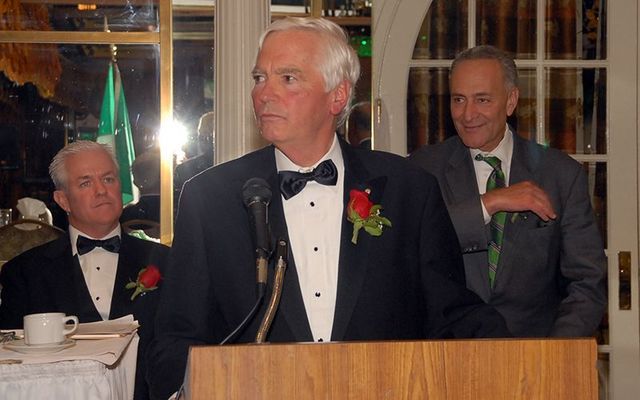Brian O’Dwyer has been an Irish American community leader for decades and intends to continue his good works as he swaps old titles for new responsibilities. Debbie McGoldrick speaks to O’Dwyer about his past work, and what he looks forward to in the future.
Like father, like son – that’s an adage that holds true in the case of Paul and Brian O’Dwyer.
Paul was the legendary Mayo man who journeyed to Brooklyn in 1925 and left an indelible mark on Irish America. A renowned civil rights lawyer and activist – especially on Irish issues – he also served on New York’s City Council, becoming its president in 1974.
Paul passed in 1998, and his son has surely followed in his footsteps. Brian has long been involved in the political life of New York City, and for decades led the downtown law office his father founded, O’Dwyer and Bernstien. He’s also spearheaded numerous philanthropic initiatives, including the Emerald Isle Immigration Center which he co-founded 30 years ago and continues to provide vital services for the Irish (and non-Irish) young and old.
After decades of service and advocacy, it’s not surprising that O’Dwyer is ready to step back, just a bit. Earlier this year he became of counsel at his law firm, delegating the daily management to other partners. He also relinquished the chairmanship of the Emerald Isle, turning his attention instead on the organization’s new building project in Woodlawn.
Losing the titles is one thing, but O’Dwyer, 72, is hardly in retirement mode.
“It seems like I’m busier than ever,” he told the Irish Voice during an interview last week.
“I’m freed from the administration of the firm and I have an opportunity now to practice more law and less accountancy. I like that. And with the Emerald Isle, I won’t be chairman but there are still plenty of things to do.”
Read more: Could a Trump US Irish visa deal really be on the cards?

New York Senator Charles Schumer and Brian O’Dwyer at the Emerald Isle Briscoe Awards event in 2004.
O’Dwyer fondly recalls the beginnings of the Emerald Isle, which sprang from the dynamic Irish Immigration Reform Movement of the 1980s that lobbied for and won, legalization for the undocumented Irish. The IIRM, as the group was known, and its volunteers simply refused to take no for an answer, and O’Dwyer remembers how impressive they were.
“I gave them advice which by the way was bad,” he laughs. “I was one of those who wished them well but thought they shouldn’t raise their heads up. Of course, they did and they were very successful.”
The Donnelly and Morrison visa programs that the IIRM fought for legalized tens of thousands of Irish, but problems remained. Navigating the dos and don’ts of America could be challenging, and O’Dwyer thought that a support group offering assistance would fill a need.
“I thought we needed to make sure that everyone—legal and illegal—were taken care of. I said we should set up an advice center that could go along with the political group. Everyone I spoke to thought it was a good idea,” O’Dwyer said.
Thus the Emerald Isle was created in 1988, in an office in Woodside, Queens, a neighborhood which was heavily Irish. The group needed funding, and O’Dwyer speaks reverently of the local Irish American standard bearer at the time, New York City Councilman Walter McCaffrey. McCaffrey arranged for the Emerald Isle’s first grant from the City Council and worked side by side with O’Dwyer to ensure its success.
Read more: Do not underestimate the racist pitch - Trump is demonizing immigrants
“Walter became our godfather,” he says. “He shepherded us through the first few years and got us our first dollars. We eventually got more support from many other groups, but with Walter, that’s how we really got started.”
The 1980s-1990s were interesting times to be Irish in America, O’Dwyer says. Being undocumented was a burden, but more often than not the Irish who came here at the time could secure a job and a place to stay within a matter of days. The Emerald Isle made a point of letting all Irish – legal or not – know their rights.
“We worked with the police to dispel rumors – and there were plenty of them going around in the bars – that the undocumented shouldn’t report crimes,” O’Dwyer says. “A lot of times people were afraid to come forward. So we had members of the NYPD address meetings, telling people not to be afraid and that their status didn’t matter.”
Employers were also prone to taking advantage of the undocumented, “especially non-union ones, telling guys hurt on the job that they had no rights,” O’Dwyer recalled.
“People didn’t know better. And that’s where we came in, educating people and letting them know their rights.”

At the Emerald Isle Immigration Center’s 1999 dinner dance. Those photographed include City Council Member Walter McCaffrey, Congressman Joe Crowley, Hillary Clinton, and O’Dwyer at the podium.
The Emerald Isle maintains its base in Woodside and also has another office in the Bronx Irish stronghold of Katonah Avenue in Woodlawn. Though the number of Irish coming to America has severely slowed since the 1980s due to a number of factors, the need for services remains strong across all sectors of the local community, O’Dwyer says.
“There are obviously fewer Irish people here, but the people are needier now, and that why the Emerald Isle has had to adapt and change,” he adds.
“The stress of being undocumented now is very different from when we started. We have difficult legal situations to deal with. The stress of being illegal in this town is wearing.”
The Emerald Isle now employs social workers to deal with those needing assistance with mental health issues, and drug/alcohol abuse. Reaching out to older members of the community is also a major part of the organization’s mandate.
Read more: ICE arrest Irish gang member and deport him to Ireland
“As our Irish population is aging we are taking steps to meet those needs,” he says.
“We have Meals on Wheels for them and other groups and meetings that they can be involved in.” In the not too distant future, those availing of the Emerald Isle’s services will have a newly refurbished building to make use of. The purchase of their building on Katonah Avenue is complete, and O’Dwyer is leading the efforts to renovate the structure into a multi-purpose facility.
“We’ve gotten some commitments from the State of New York, from Governor Cuomo and the City Council, particularly Speaker Corey Johnson and Danny Dromm,” O’Dwyer says.
“It’s going to be a great place when it’s done. The first floor will be offices. We’re adding an elevator to access the second and third floors which will be totally renovated into meeting rooms and event spaces.
“I’m really excited about the project and glad that I have the time to focus on getting it done,” he added. “It’s going to be fabulous for the community, right in the heart of Katonah.”
The timeline for completion is two to three years, and when it’s complete, “it will be a wonderful and lasting legacy for the Emerald Isle,” O’Dwyer adds.
Memories? O’Dwyer has a few. He doesn’t hesitate when asked for the one that stands out the most.
Back in the 1980s, he remembers a young undocumented Irish woman who was enrolled in Hunter College, working as a nanny to pay the bills. In her second semester, she hit a snag – the school inquired about her legal status and told her she couldn’t continue studying without authorization. She was heartbroken.
“I remember her so clearly. We were lucky that Ed Koch was mayor at the time,” O’Dwyer says.
“I knew his chief of staff Diane Coffey and explained what was happening. I said it wasn’t right, that we should welcome these people because they want to be productive members of society.
“Koch was running for re-election, so we got him at the right time. To his credit, he immediately got hold of the trustees of the City University of New York and almost overnight changed their policy to allow the undocumented admission. For sure it’s one of the things I’m proudest of, that thousands of young people from all nationalities have been able to avail of a CUNY education that they wouldn’t have been able to get.”
O’Dwyer was a staunch supporter of Bill and Hillary Clinton practically from day one. He traveled to Ireland with them many times and acted as an Irish affairs advisor, and raised a fortune for their political campaigns. Putting it mildly, the 2016 presidential election was a huge disappointment.
“For sure. But [wife] Marianna and I look back and we think we were very fortunate. I’m able to say that I played a role in the peace process – I don’t overplay my role, but I was one of many who had an influence. And we look back on all the wonderful times, the state dinners when Bill Clinton was president, and all the other occasions. We feel blessed by all of that,” he says.
O’Dwyer wasn’t kidding when he mentioned that he’s busier than ever. He was recently appointed a member of the Javits Center Corporation, which runs New York City’s renowned convention space. The appointment by Governor Cuomo required State Senate confirmation, and O’Dwyer will be involved in the planning and operation of the center.
“I’m looking forward to making sure that the workers there are being treated fairly, and to maintaining a strong center that will provide lots of jobs,” he says.
Next month will be a particularly momentous one for the O’Dwyers, with the visit to Ireland of Pope Francis. The Pope will journey to Knock Shrine in Mayo, and as O’Dwyer is the international chairman of the board of Ireland West Airport at Knock, a meeting with the Pope is assured. His little granddaughter Hailey will be along for the historic trip.
The return to Mayo is always a welcome one for O’Dwyer. It’s a place where he feels just as home as his native New York City and one that he’s committed to forever.
“I’m the son of an immigrant, and he made it in this town,” O’Dwyer says. “I wouldn’t be here if it wasn’t for where my father came from, and for the people who welcomed him to New York.
“He made it on his hard work, and also the fact that there were people in those days, particularly in the county associations, who took care of the young immigrants. We became the heirs to that tradition of a helping hand, and it’s one I take very seriously.”
Visit www.odblaw.com




Comments